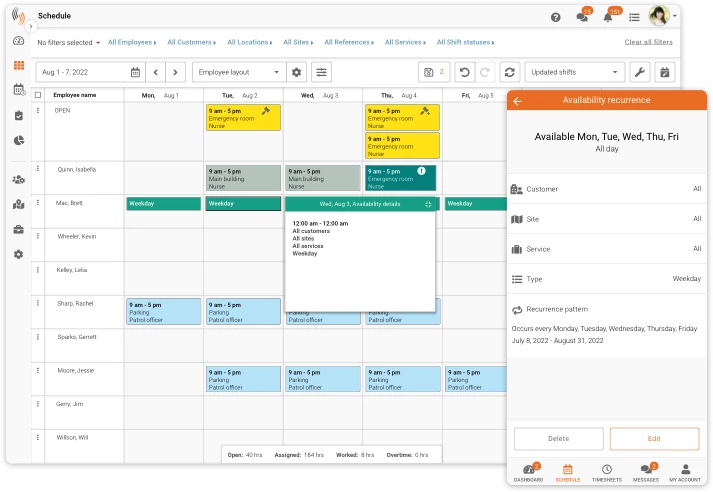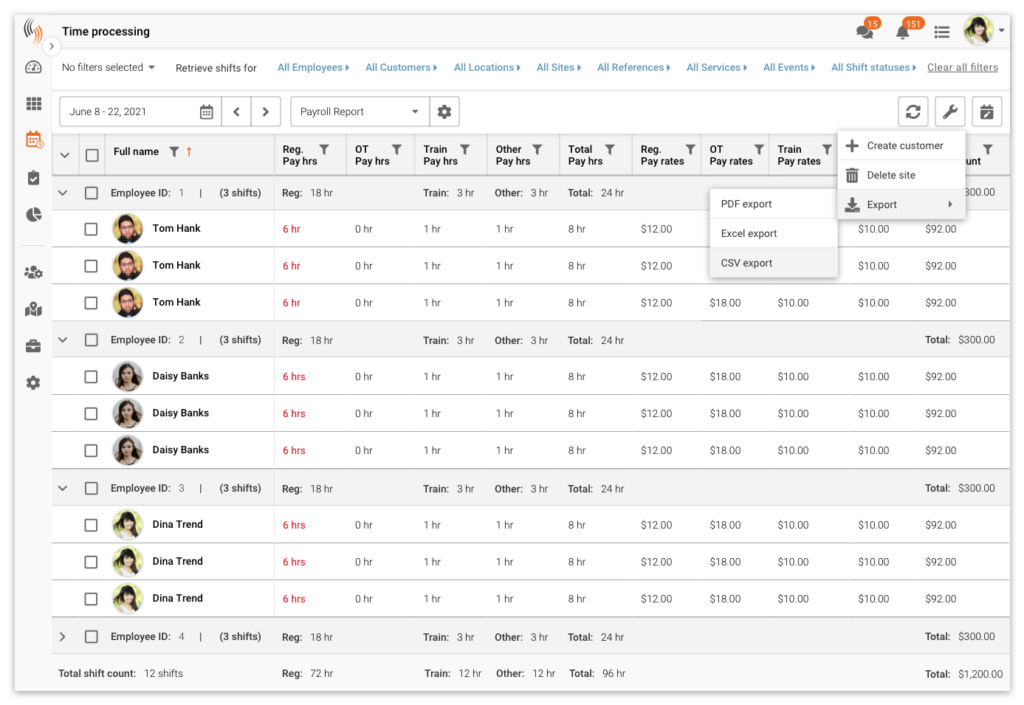As we continue to traverse the era of remote work, more organizations are embracing the concept of an on-call workforce. In fact, statistics on remote workers tell us that more than 4.7 million people work remotely at least half the time in the United States. This new normal has necessitated the development of innovative on-call employee scheduling solutions to ensure efficient operation. This blog post will explore some of these cutting-edge strategies for managing an on-call remote workforce.
The Importance of On-Call Scheduling
On-call scheduling plays a critical role in businesses that rely on immediate problem resolution, like IT, customer service and security/public safety. It ensures that there’s always someone ready to step in when an issue arises, regardless of the time or day. This type of scheduling helps maintain optimal service levels, while also providing employees with the flexibility of remote work.

However, effective on-call scheduling can be complex. It requires balancing employee availability, skill sets, and workload. This is where innovative on-call scheduling solutions come in, offering new ways to manage these challenges.
On-Call Scheduling Challenges in Remote Workforces
Remote workforces present unique challenges for on-call scheduling. First, there’s the issue of time zones. With employees spread across different regions, timing and coordination can be tricky. Additionally, communication can be more challenging with remote teams, making it harder to manage real-time scheduling changes.
Another challenge is ensuring fairness in the distribution of on-call duties. Without physical boundaries, it’s easy for some employees to bear a heavier burden. To manage these challenges, we need innovative on-call scheduling solutions specifically designed for remote workforces.
Innovative Solutions for On-Call Scheduling
AI-Powered Scheduling Tools
Artificial Intelligence (AI) is reshaping the landscape of on-call scheduling. AI-powered tools can automatically generate schedules based on a variety of factors such as employee availability, skills, and historical data. These solutions offer the advantage of reducing manual work and minimizing scheduling errors, a boon for remote workforces. Celayix has been using AI in our scheduling tools for a number of years now to provide optimised schedules in a number of minutes.

Mobile-Friendly Apps
In today’s digital age, having mobile-friendly on-call scheduling solutions is crucial. These apps allow employees to access their schedules, swap shifts, and communicate changes from anywhere. This is particularly beneficial for remote employees who may not have access to traditional office resources. The Celayix mobile app acts as both a schedule companion for employees, as well as a time clock. Employees can check in/out of a shift right from their phone.
Cloud-Based Platforms
Cloud-based scheduling platforms offer another innovative solution. These platforms centralize scheduling, communication, and documentation in one place, accessible from anywhere. This means that regardless of where your on-call staff is located, they can view their schedule, log their work, and communicate with their team in real-time. Celayix is a cloud-based platform meaning employees from anywhere can access their schedule and talk to managers in real time.
Evaluating On-Call Scheduling Solutions
Selecting the right on-call scheduling solution for your remote workforce involves careful consideration. Here are some factors to take into account:
Scalability
The chosen solution should be able to handle the size of your workforce, both now and as your business grows. Look for solutions that can easily accommodate increases in on-call staff.
Usability
The scheduling software should be user-friendly. If the system is too complex, it may lead to errors and frustration among your staff. This should be considered from the point of view of both schedulers and employees! If employees don’t know how to check their shifts or input their availability, there’s a chance shifts will be missed or employees will become frustrated.

Customizability
Every business has unique scheduling needs. The best on-call scheduling solutions are those that allow for customization. This flexibility ensures that the system can adapt to your specific requirements. A great customizable feature of Celayix is our rules-based engine for scheduling. It allows schedulers to create rules specific to their business needs which will determine how the automated scheduler will create your schedules.
Integration
A good scheduling tool should integrate seamlessly with other business tools such as HR systems, project management tools, and communication platforms. This integration ensures a smooth workflow and reduces the risk of data discrepancies. Without the right integrations, your payroll and billing data can be littered with errors which ultimately cost you money.
Implementing On-Call Scheduling Solutions
Once you’ve chosen the right on-call scheduling solution for your remote workforce, the next step is implementation. Here are some tips for ensuring a smooth rollout:
Clear Communication
Effective communication is essential when implementing a new scheduling system. Ensure that all team members understand why the new system is being introduced, how it works, and what benefits it offers. Unless employees are clear on WHY a change is happening, it’s likely the change will fail to be adopted.
Training
Provide thorough training on the new system. This should include both technical training on how to use the software, as well as operational training on processes like how to swap shifts or report issues. The more familiar your employees and schedulers are with these tools, the more effective they will be!
Support

Offer ongoing support to help staff adjust to the new system. This might involve having a dedicated support team or providing resources like FAQs and troubleshooting guides. You should also consider the support offered by your software provider. Is it included in your package? Is it 24/7? How responsive is it? Celayix has a great support team that offers round-the-clock support to all of our customers regardless of size.
Future Trends in On-Call Scheduling
With the continuous evolution of technology and increasing adoption of remote work, the future of on-call scheduling looks promising. Here are some trends to watch out for:
Predictive Scheduling
Predictive scheduling, powered by AI, uses historical data and algorithms to forecast staffing needs. This predictive capability can help businesses plan their on-call schedules more efficiently, minimizing last-minute changes and disruptions. Here at Celayix, we’re already embracing this technology.
Greater Emphasis on Employee Wellness
Employee wellness is becoming a significant factor in on-call scheduling. Innovative solutions are now offering features that help prevent burnout, such as limits on consecutive shifts and ensuring adequate rest periods between shifts. The concept of overtime is also being thoroughly examined for how detrimental it can be to employee well-being. With the rules-based engine offered by Celayix, schedulers get notifications whenever they schedule overtime if that’s a rule they’ve set up. We’ve helped organizations completely eliminate unnecessary overtime!
Increased Use of Analytics
Analytics can provide valuable insights into on-call scheduling. For example, analyzing patterns in shift swaps or absences can help identify potential issues and guide improvements in scheduling practices. More and more employers are turning to in-depth reporting and analyses of their employee scheduling to make well-informed decisions.

In conclusion, managing an on-call remote workforce is a complex task that can be made easier with innovative on-call scheduling solutions. By investing in the right tools and strategies, businesses can effectively manage their on-call staff, improve service levels, and ensure a balanced workload. The future of on-call scheduling promises even more advanced solutions that further enhance efficiency and employee wellness. Embrace these innovations and make the most of your remote on-call workforce.
In this era of digital transformation and remote work, having a robust on-call scheduling system in place is not just an option—it’s a necessity. Get in touch with us today to learn more about our employee scheduling software and to see a free live demo.





